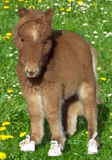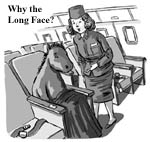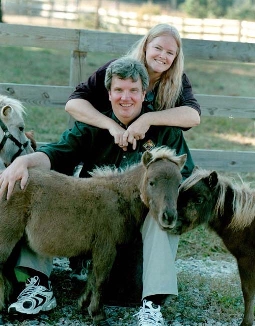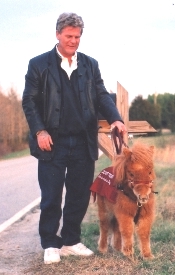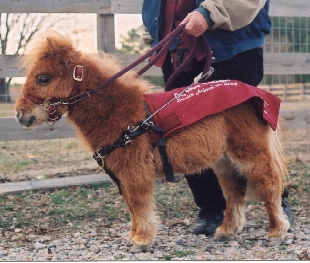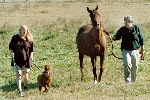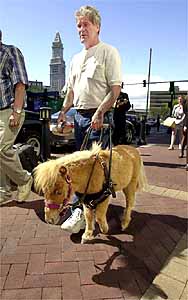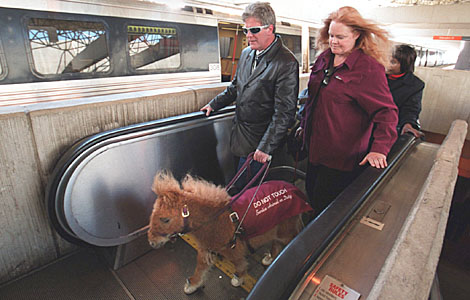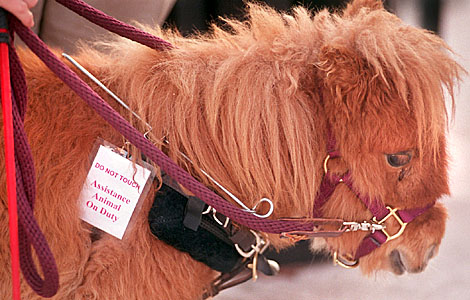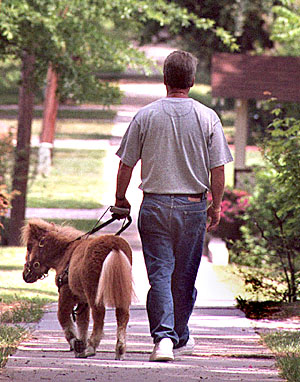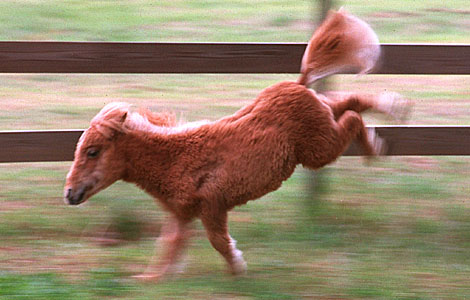|
|

Blind teen tells Nampa council she needs horse to get around
NAMPA — Nampa law prohibits people — even blind people — from riding horses on city streets. But a young blind woman who relies on her brown pony says hers is a special case. The Nampa City Council this week decided to deny Tabitha Darling immediate permission to ride her horse around town but did agree to take another look at the city´s rules. Nampa law prohibits horses on city streets except for special occasions, such as parades. Darling, an 18-year-old student at Boise State University´s Canyon County campus, had been riding her horse to and from classes until police officers told her to stop. Darling, who is legally blind, can see well enough to ride the horse but not well enough to drive a car. Darling had sought city council permission to continue using her pony to get from her home to campus and to other appointments. She said she rides her horse to make visits to several elderly women and to help another woman who works with injured birds. “I guess I´ll have to use my dad” to get around, she said. “I can´t depend on him forever.” Her father, Rob Darling, said the pony — named Trixi — is an “assistive” animal for his daughter, who also has had hip and leg troubles since birth. The family said Tabitha should be excepted from horse laws the way people with disabilities get exceptions for other guide animals, such as seeing-eye dogs. The family purchased the horse a couple of months ago. Rob Darling said taxis are too costly — $12 for a trip across town — and the bus route in Nampa doesn´t get Tabitha close enough to her destinations. Treasure Valley Transit does have a door-to-door service for disabled people, but riders can use it just once a week and during limited hours. Other services for the disabled charge about $8 per trip in Nampa. Assistant Chief of Police Tim Vincent told the City Council on Monday that the department has received several complaints about the pony and the way it was being ridden. Vincent said callers reported that the horse had been a hazard on busy streets downtown; that it was being ridden at a gallop; that the rider didn´t seem to have control of the horse; and that drivers were having trouble seeing the horse when it was ridden at night. Vincent also said Trixi reportedly tore up grass near public parks and areas. Safety is a critical issue, Vincent said. “A horse is not going to mix well with traffic in a downtown area,” he said. Tabitha Darling said she has changed her route to stay away from busy streets and only occasionally lets Trixi speed to a gallop to blow off steam. Rob Darling said government attorneys in Washington, D.C., who deal with the Americans with Disabilities Act told him that horses have been allowed as assistive animals in other places, including Atlanta. “They said it´s illegal under federal law for any city to restrict anyone from using an assistive animal,” he said. On Monday, Nampa City Council members said they were sympathetic to Tabitha Darling´s plight, but wary because the city could be liable in the event of an accident. “Perhaps there needs to be some consideration given to rider responsibility,” Councilman Martin Thorne said. “I think legally we need to address if there is liability insurance available.” The council asked city staff to look into how other cities have handled similar situations. It also wanted staff to examine safety and liability and possible routes Tabitha Darling could take around town. To offer story ideas or comments, contact Sandra Forester Edition Date: 11-06-2002
|
Guides Training Press Photos News Apply FAQ Wishes Contact Home
|
Copyright © 1998 - 2004 by the Guide Horse Foundation Inc. Guide Horse ® is a registered trademark of the Guide Horse Foundation Inc.
|
|
Get the Book!
|
Now you can read the book that tells the
story of the development of the Guide Horse training program! Learn the
techniques used to train a reliable, safe service horse.
|
The Guide Horse Foundation has the utmost respect for The Seeing Eye® and their seventy-two years of outstanding work with assistance animals for the blind. Please note that The Guide Horse Foundation is not affiliated with or sanctioned by the Seeing-Eye® or any of the Guide Dog training organizations. Seeing-Eye® is a registered trademark of the Seeing-Eye, Inc.
